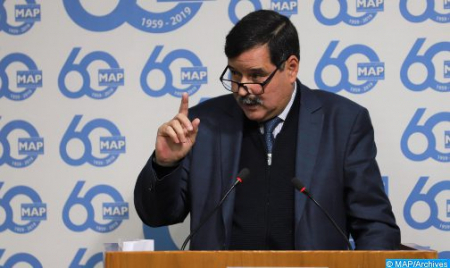Decay of Algerian Regime’s Allegations about Moroccan Sahara Is its Biggest Failure- Journalist
The biggest failure of the Algerian military regime lies in the decay of its allegations about the dispute over the Moroccan Sahara, and the resulting bitter hostility translated into a series of boycotts against the Kingdom, writes journalist Talaâ Saoud Al-Atlassi. In an op-ed published on Monday on Moroccan news outlet “Machahid 24” under the title “The setbacks of the Algerian regime…exacerbated by Russia,” Al-Atlassi stresses that the military regime watches with despair the increase in contempt of the international community for its allegations, as reflected in the attitude of this regime at the international level showing decline and agony. In contrast, there is an overwhelming and decisive international alignment in favor of the position of Morocco, which confirms the superiority of the Kingdom and represents an explicit recognition of Morocco’s territorial integrity and a clear endorsement of its peaceful approach, he says. In this context, the journalist recalls that the Republic of Suriname has joined the countries acknowledging the Moroccan Sahara and supporting the Moroccan Autonomy Plan. In his opinion, the strategic, economic and diplomatic factors of Morocco, in general, have contributed to mobilizing international support for the Moroccan Autonomy Plan, based on the immutable principle of the Moroccanness of the Sahara. The Algerian military regime has no deterrent effect on this diplomatic flow, nor does it have the capacity to curb the growing respect for Morocco internationally, Al-Atlassi notes. “It is a bitter failure for the Algerian regime and a string of sufferings it has undergone from the countries of the Gulf Cooperation Council (GCC), the United States, Spain, Germany, Egypt, several African countries, the group of Eastern European countries and the countries of the Caribbean Community,” writes the author. The list is not exhaustive if one counts the countries that have not officially expressed their positions in favor of Morocco but voted for the recent Security Council resolution, which adopted the provisions of the Moroccan Autonomy Plan without naming it, such as France, the United Kingdom and China, but also Russia which did not oppose the resolution. That being said, the Algerian regime has engaged in a campaign of offense and insult against the international community, while accusing the countries that voted in favor of the Security Council resolution of “collusion” with Morocco, explains the author, adding that the UN resolution fell like a knife on the Algerian regime and its sidekick the polisario. By abstaining, Russia gave reason to the said resolution that has severely stunned the Algerian regime which is increasingly suffering from a bitter political solitude. “The diplomatic setbacks suffered by the Algerian regime made it lose the insight needed to manage its foreign relations,” Al-Atlassi goes on. What happened at the end of last week “may be the spark that will fan the flames of a new failure for Algerian diplomacy. This failure could even prove to be the most bitter of all setbacks, the author says. Driven by a foolish quest to disturb Morocco, Algeria tried to derogate Russia’s ambassador in Algiers Igor Beliaev, to the orientations of his country by stating that “the sahrawi people have the same right to self-determination as the Palestinian people,” notes Al-Atlassi. Since the beginning of the dispute over the Moroccan Sahara, Russian diplomacy has not used the term “Sahrawi people”, the author underlines, recalling that Russia does not recognize the so-called “sahrawi republic” nor does it give any diplomatic treatment to the “polisario” front. “Russia is committed to the resolutions of the Security Council and it measures at their true value its relations with Morocco and their promising prospects.” The references guiding the Russian approach to the dispute over the Moroccan Sahara are immutable and clear, including the fact of avoiding any disruption of Russian-Moroccan relations, as Mikhail Bogdanov, the number two in the Russian Foreign Ministry, rightly said. Only two days after the statement of the Russian ambassador to Algeria, Russian President Vladimir Putin decided to send him back to Moscow and appoint Valerian Shuvaev, who is none other than the Russian ambassador to Morocco since 2018, says Talaâ Saoud Al-Atlassi. Russia, a state whose diplomacy is deeply rooted in history, does not take such decisions with spontaneity or lightness, he continues, adding that the Russian decision abounds in positive messages towards Morocco and negative ones towards Algeria. “The major setback for Algeria is that Moscow gives precedence to Morocco in its diplomatic preferences in the region, and extends the channels of understanding, cooperation and mutual respect with the Kingdom,” notes Al-Atlassi. Russia respects the fact that Morocco defends its rights and preserves its interests while respecting the rights and interests of the various parties involved in its international relations which are multiple, varied, realistic, clear and beneficial to all, he stresses. What happened is a setback for the Algerian regime, which adds up to a long series of setbacks and paves the way for other failures to come as a result of Algerian policies which reflect grudges and short-lived narrow calculations, he concludes.

